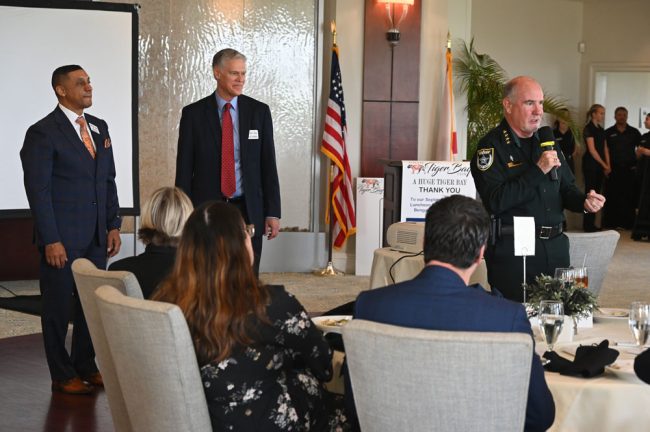
When Roger Handberg asked the capacity crowd at Flagler Tiger Bay Club’s season-opening lunch Wednesday for a show of hands from those who’ve been victims of a fraud or who knew someone who had, almost every hand went up.
That was his point. “These schemes are all over the place,” he said. They indiscriminately target the vulnerable and those who think they’re untouchable.
Nobody mentioned the more than $700,000 the Flagler County school district lost to one such scheme two years ago, but Sheriff Rick Staly was nodding to the familiarity of Handberg’s accounts, and made an unsurprising revelation: “The fastest growing unit in the sheriff’s office right now is my cyber crime unit, and the other tip I would give you is that we’ve had people lose up to a million dollars.”
The unit started with one detective. It now has two, with a third about to be assigned, all in about two and a half years. That’s due to crypto fraud and other “fraud that’s generated from somebody on the other side of a keyboard, including crimes against children,” the sheriff said.
Most of the local crypto fraud cases are between a few thousand dollars and $20,000 to $30,000 oin losses, but there’s been a $300,000 loss and a $1 million loss, all done the way Handberg would end up describing to the audience–by fraudsters convincing unsuspecting victims to make deposits for one seemingly innocent or beneficial purpose or another. That was the theme of Handberg’s talk.

“I feel like every time I talk to you all, I give you really, terribly depressing topics,” Handberg, a former U.S. Attorney for Florida’s Middle District, told the crowd. Last year when he addressed Tiger Bay it was all about fentanyl smuggling, arrests, overdoses. It was bleak. So bleak that “I believe that I was the reason that Judge Perkins decided to retire,” Handberg said.
Perkins retired two weeks after Handberg’s talk last year. Perkins was back yesterday, sitting alongside half a dozen other judges in the Seventh Judicial Circuit for Handberg’s return, and probably knowing that it was Handberg who got the shorter end of the stick: A 2022 Biden appointee, he was shown the door, as U.S. attorneys often are, when Biden’s successor–a felon 34 times over–returned to the White House.
Handberg landed at GrayRobinson, the elite Orlando law firm, where he’s a litigator, using his experience prosecuting white collar crime and government investigations. He drew on that experience to give the audience a tutorial on the psychology and variety of fraudsters, and on how to try to stay a step ahead of them. Handberg’s prosecutorial career had a notable turning point because of one of the most famous American fraudsters.
Louis Pearlman is the man who, through his Orlando-based Trans Continental Records, launched the Backstreet Boys and NSYNC, which became two of the best-selling boy bands of all time. He was also the man who ran one of the most elaborate Ponzi schemes of all time. He’d fabricated an airline, fabricated an employee investment savings account, fabricated the accounting firm that handled the accounts (it was nothing more than an answering service, and a bogus office set up in Germany to look like an accounting firm) to deceive the more than 1,500 “clients” he was defrauding.
“I had a chance to talk to a lot of victims, and I can tell you, as a prosecutor, there’s no worse feeling than not being able to help somebody the way you want to help them,” Handberg said. “These are people whose lives were destroyed. So I took it as a mission at that point to try to do what I could on fraud cases, and elder fraud cases in particular.”
Handberg prosecuted Pearlman, who was convicted and sentenced to 25 years in federal prison, dying eight years into his sentence in 2016.
“Every Ponzi scheme has the seeds of its own destruction built into it,” Handberg said. “ I want to tell you a little bit about that case, because you’re going to see threads of that in other schemes that are happening now in our community.” He spoke of the commonalities between fraud schemes and the way the schemers prey on vulnerable people with immediate needs–like IT or government-impostor schemes or lottery schemes.
Example: A caller tells you that you won the lottery. People at the receiving end believe it–even when they haven’t played the lottery. They’re told that first, they must pay taxes on their winnings. They believe it. They pay.

It gets worse when the schemers use public records to learn personal details about their victims, using those details to win the victims’ trust. “What these criminals are doing is it’s more targeted than it used to be. They are investing and learning about you,” Handberg said. Example: the schemers who call and tell the person who just missed jury duty that there’s a warrant for their arrest unless they pay. So they pay. (Authorities will never pull a stunt like that by phone.)
Handberg’s mother once got a text message that he had been arrested in Spain. He had not been. But whoever had targeted her knew that she and Handberg did not have the same last name. They’d made that much research. Still, his mother sensed the red flag, called Handberg’s wife, and confirmed that it was a scheme.
“Time is the enemy of these schemes,” Handberg said. The fraudsters need to operate quickly. The moment the potential victim raises red flags or delays, they run. “If you hang up on one of these people, you probably have reduced your probability of being victimized by about 99 percent. It’s tough. It’s tough because in our country, we’re taught to be so polite.”
Legitimate institutions are now aware of the rampant scheming, and if they get hung up on by a client who calls back to make sure it’s legit, they will understand. It’s part of doing business today. “ Because the problem we have is you’ve got to be 100 percent vigilant. You can’t have your guard down for a moment,” Handberg said.
Staly said he is working with Florida Sen. Colleen Burton, the Polk County Republican, “to hopefully pass some legislation that will put regulations on the crypto ATMs,” which are unregulated and bypass regular banking channels, as well as withdrawal limits or notification triggers. Crypto ATMs also charge astronomical user fees. “The money is never reported, and it’s a way to bypass taxes,” Staly said.
When people get defrauded through such schemes, “you can report it to the FBI or the C3 that Roger mentioned,” meaning the Cyber Crime Center, “but they get so much of it that unless it’s huge, huge losses, I’m talking millions of dollars of losses to one victim, they don’t investigate it.So it’s really up to the local law enforcement to investigate it. So I’ve invested in the sophisticated software that we need to be able to track crypto currency in the blockchains that are used when it’s reported. But if victims don’t realize that they are the victim of a scam, or they’re too embarrassed, or they do realize it and wait days or weeks, the likelihood of an investigation being successful to get any money back gets smaller and smaller every day that is delayed.”
That’s before considering the coming impact of artificial intelligence on cybercrime, compounding the need for “vigilance,” Handberg’s recurring theme.
“That’s what the fraudsters are relying on, is that people are so busy. You’ve got a business, you’ve got kids, you’ve got all these things,” he said as he was ending the Q&A segment. “When I say you’ve got to be 100 percent vigilant, you have to be right 100 percent of time. Bad guys have to be right once, and if they’re right once, you know what they get? Usually get about $80,000.”
Handberg was perhaps unknowingly if not unwillingly echoing the reasoning of Cesare Beccaria, the Enlightenment criminologist, who reasoned that many a criminal understandably takes the risk of one day hanging–a single day of pain–in exchange for a lucrative crime’s many years of riches and freedom. In a roomful of judges, the echo quickly dissipated as Tiger Bay’s hosts moved on to the distribution of door prizes and the obligatory tigerish wine for the guest speaker, now that he’s out of his teetotalist job.





























Greg says
I don’t think the sheriffs department really cares about this issue? I was cheated out of $1500 several years ago. I had a name, address, and phone number. All I was told that they can’t help, it’s most likely out ofvthd country. It was NOT, it was kids in New Jersey. $1500 pissed away and turned away by Staleys officer.
BIG Neighbor says
https://youtu.be/t4NuL8_Murg
Please take time to view. Now that AI technology can amplify this threat, you don’t need to be just caught off guard to become another victim of Fraud, just a willing participant by keeping silent on such domestic threats like the proliferation of novel schemes like crypto ATMs. Now that Bad Faith acting is normalized, learn what that means by familiarizing yourself with the term Elicitation (https://www.fbi.gov/file-repository/private-sector-partnerships/elicit_corp-508.pdf/view) (https://sites.google.com/site/freciedensustainability/freci-eden/elicitation-and-bad-faith-actors).